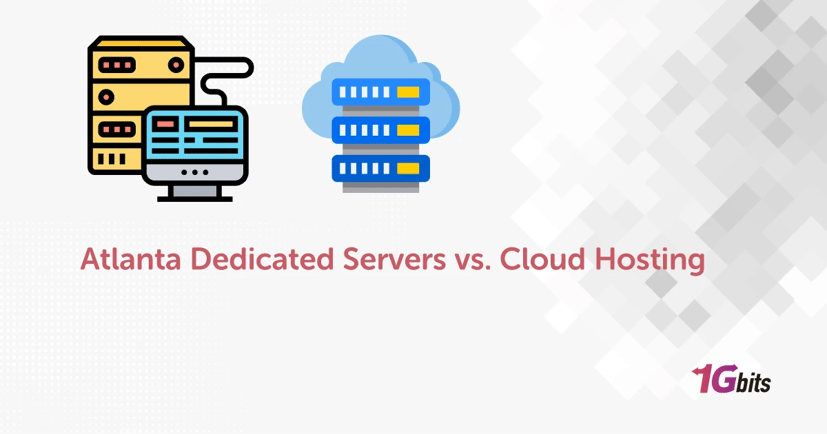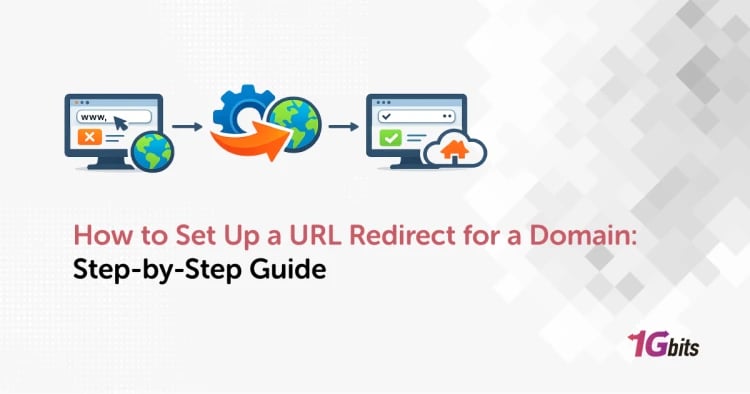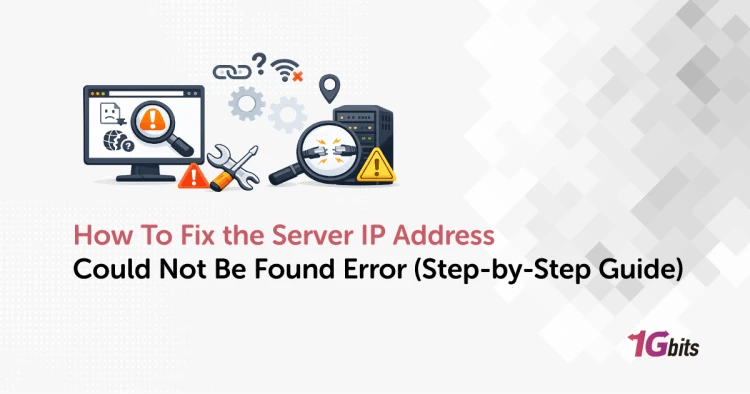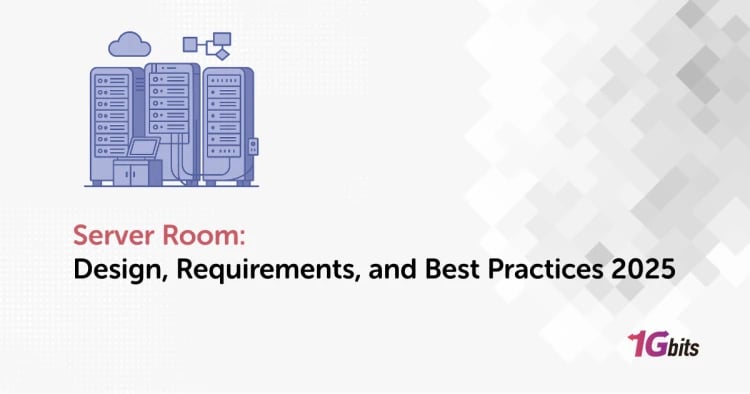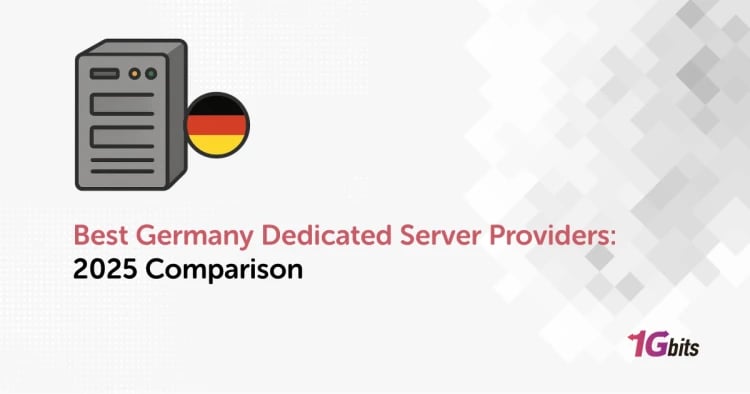If you’re looking to launch a large app or website in Atlanta, you have two main options: dedicated servers and cloud hosting. But which one is the better choice? Each has its own unique benefits and costs, and the right choice can have a significant impact on the performance, security, and scalability of your business. In this article, we’ll explore the key differences between Atlanta dedicated servers and cloud hosting so you can choose the best option for your specific needs.
⚡ What Are Atlanta Dedicated Servers?
Atlanta dedicated servers are physical machines located in data centers around Atlanta, Georgia, rented or owned exclusively by a single organization. They offer full control over hardware, software, and configuration while ensuring maximum performance, reliability, and security.
Because resources such as CPU, memory, and bandwidth are not shared, performance remains consistent even during heavy workloads. These servers are ideal for businesses that need strong computing power, high customization, or strict security and compliance.
✅ Benefits of Atlanta Dedicated Servers
The advantages of dedicated servers include the following:
-
Superior Performance: All resources belong to one user, making them suitable for handling heavy traffic or demanding applications.
-
Full Customization: You have total control over hardware and software to configure the server based on your business needs. You can also explore how to choose and compare leading dedicated server providers.
-
Enhanced Security: Since the server is not shared, risks from other users are minimized, ensuring higher protection.
-
Low Latency: Hosting in Atlanta reduces latency for users across the Southeastern United States thanks to its proximity to major internet exchanges.
Need full control, top security, and stable performance for your Atlanta-based applications? Our Atlanta Dedicated Server provides expertly managed resources, low latency, and 24/7 support so you can scale your business with confidence today.
☁️ What Is Atlanta Cloud Hosting?
Atlanta cloud hosting is a hosting service that provides access to virtual servers hosted across a network of physical machines in data centers around Atlanta. Unlike dedicated servers, cloud hosting utilizes virtualization technology to pool resources from multiple servers, which are then dynamically allocated based on demand. This type of hosting offers greater scalability, flexibility, and cost-efficiency, especially for businesses with fluctuating resource needs.
🧩 Advantages of Atlanta Cloud Hosting:
Some of the most important benefits that the Best Hosting Atlanta providers offer include:
-
Scalability: Resources can be easily scaled up or down based on traffic or business needs, ensuring you only pay for what you use.
-
Redundancy & Reliability: If one server in the network fails, others can take over, ensuring minimal downtime and high availability.
-
Cost-Efficiency: The pay-as-you-go model makes cloud hosting more affordable for small businesses or startups with unpredictable workloads.
-
Flexibility: Cloud hosting can adapt to different workloads, making it a versatile choice for businesses of all sizes.
Looking for a hosting option that’s easy to scale and keeps costs under control? With our cloud VPS, you get reliable performance, instant resource adjustments, and full support so your business stays fast and flexible from day one.
Dedicated server vs cloud hosting: Key Differences
The table below provides a clear comparison of performance, cost, security, and scalability aspects between Atlanta dedicated server and Atlanta cloud hosting:
|
Feature |
Atlanta Dedicated Server |
Cloud Hosting in Atlanta |
|
Performance |
Stable and powerful performance with no resource sharing |
Dynamic performance, but resources may be shared among users |
|
Scalability |
Requires physical hardware upgrades, limited scalability |
Instantly scales up or down automatically based on demand |
|
Cost |
High upfront cost with fixed monthly payments |
Pay-as-you-go pricing with lower initial cost |
|
Control & Customization |
Full control over hardware and software configurations |
Limited control, depending on the cloud platform |
|
Security |
Very high, as all resources are physically dedicated |
High, but infrastructure is shared among multiple users |
|
Management |
Requires manual management or an in-house technical team |
Can be fully managed with automated support options |
|
Reliability & Redundancy |
Depends on physical hardware; downtime possible during repairs |
Automatic failover—other servers take over in case of failure |
|
Data Location |
Data stored in a specific location (e.g., Atlanta data center) |
Data distributed across multiple data centers |
|
Best Use Case |
High-traffic applications, sensitive data, long-term projects |
Startups, dynamic websites, and rapidly growing projects |
|
Billing Model |
Fixed monthly or an |
While the table above clearly shows the differences between cloud and dedicated servers in Atlanta, let's explain some of these differences further.
💰 Cost Comparison: Dedicated Server vs Cloud Hosting
Dedicated servers typically have a higher initial cost because you rent or buy the entire hardware and have to pay for the entire resource even during low usage. In contrast, cloud hosting has a pay-as-you-go model and you only pay for the resources you use.
On average, the monthly Atlanta server hosting cost is around $313, while a dedicated server costs $1,476. So, for variable and scalable needs, Cloud is a more economical option, but for stable loads and high performance, Dedicated provides more value.
⚙️ Performance and Scalability
Dedicated Server with dedicated resources provides stable and powerful performance for heavy applications, complex analytics, or large databases, and there is no interference from other users. In contrast, Cloud Hosting uses virtualization and dynamic provisioning, enabling real-time scalability, meaning you can scale up or down resources on the fly.
As a result, if your project requires rapid response to traffic fluctuations, Cloud is a better choice, but for stability and complete hardware control, Dedicated is superior.
🔒 Security and Management
In terms of security, both models are strong. Cloud ensures protection through redundancy, automated backups, and expert security teams. Dedicated Servers offer full isolation and control, making them ideal for sensitive data or compliance with Atlanta and Georgia storage laws. For management, there are two service types:
-
Managed: The provider is responsible for maintenance, support, and updates.
-
Unmanaged: You have full control but must handle the technical management yourself.
Providers like 1Gbits typically offer 24/7 support for both models to keep your infrastructure stable in times of crisis.
Hybrid Hosting Solutions
Sometimes the best choice is to combine two hosting styles; that’s where hybrid hosting comes in. This approach allows businesses to simultaneously benefit from the security and control of a dedicated server and the flexibility and scalability of cloud hosting. In this model, each part of the system is placed in the appropriate environment based on its performance and security needs:
-
Dedicated Server as the core: Sensitive data and databases are kept on dedicated infrastructure to ensure physical isolation and security compliance.
-
Cloud for scalability and business continuity (Disaster Recovery): Development, test, and high-traffic environments are hosted on the Cloud, which is also used for emergency backup to ensure data remains available in the event of a disruption.
Many companies in Atlanta use this model because the city, with its Carrier Hotels and Internet exchange centers, is one of the major network hubs in the Southeast United States and an ideal place to implement a hybrid architecture.
Why Choose Hosting in Atlanta?
Choosing a data center in a strategic location like Atlanta, known as the “Gateway to the Southeast” and a major economic hub, creates a significant competitive advantage.
1. Atlanta; Connectivity Hub and Carrier Hotels
Due to its location on major fiber optic routes, Atlanta is a key hub for America’s Internet infrastructure. The city’s data centers often act as Carrier Hotels; high-density network buildings that provide direct, secure access to hundreds of networks, cloud providers (such as AWS and Azure), and financial companies.
2. Low Latency for Key Markets
For time-sensitive systems like online payments, every millisecond is critical. Hosting in Atlanta significantly reduces network latency for users in the southern and central United States:
-
To Dallas (DFW): Average latency is around 17ms.
-
To New York (NYC): Average latency is around 18ms.
These low-latency connections also provide critical connectivity routes to major cities like Washington, D.C., and Miami.
For these reasons, choosing dedicated or Cloud infrastructure in Atlanta also improves the speed of access for regional customers and the efficiency of online systems.
Choosing the Right Hosting for Your Atlanta Business
After assessing your business needs, the next step is choosing the hosting model that fits best. The table below helps you determine whether Dedicated, Cloud, or Hybrid Hosting aligns with your goals.
|
Strategic Question |
If Your Answer Is “Yes” |
Recommended Solution |
Technical Explanation & Reason |
|
Is your workload heavy and consistent over time? |
Yes |
Dedicated Server |
All resources are reserved for you, ensuring stable, predictable performance and lower TCO (Total Cost of Ownership) in the long run. |
|
Do you need rapid or unpredictable scalability (e.g., for marketing campaigns or seasonal spikes)? |
Yes |
Cloud Hosting |
Instant scaling with just a few clicks. You pay only for what you use, making it highly cost-efficient for growing businesses. |
|
Do you handle sensitive data (e.g., PHI, financial info) and require physical isolation? |
Yes |
Dedicated Server |
Single-tenant architecture gives you full hardware control and helps ensure compliance with regulations like HIPAA or GDPR. |
|
Is your internal IT team small, and you want to offload infrastructure management? |
Yes |
Managed Cloud Hosting |
The provider manages hardware, maintenance, and updates, allowing your team to focus on applications and growth. |
|
Is low latency to South/Central US markets (Dallas, Miami) critical for you? |
Yes |
Atlanta Dedicated Server |
Atlanta’s proximity and network infrastructure deliver ultra-low latency and faster response times for users in nearby regions. |
|
Do you want to keep your primary database on-premise but use the cloud for backup or disaster recovery? |
Yes |
Hybrid Hosting |
Combines the security of dedicated hardware with the flexibility of cloud backup via Atlanta interconnection facilities. |
|
Are you expecting rapid business growth and user expansion? |
Yes |
Cloud or Hybrid Hosting |
Cloud hosting supports instant scalability, while hybrid offers both performance stability and flexible scaling as you grow. |
|
Do you need strict control over data location for regulatory or compliance reasons? |
Yes |
Atlanta Dedicated Server |
Data remains physically stored within a defined region, helping you meet local and federal compliance requirements. |
As you see, each hosting model serves a distinct purpose.
-
Dedicated Servers offer stability, isolation, and full control, which is ideal for high-performance and security-focused businesses.
-
Cloud Hosting provides agility, scalability, and cost efficiency, which is perfect for startups or fast-growing companies.
-
Hybrid Hosting combines both delivering the reliability of dedicated servers with cloud flexibility.
Matching your technical needs to these options ensures a hosting setup that grows with your business while maintaining performance, compliance, and efficiency.
Case Studies: Real Atlanta Business Hosting Success Stories
To make the choices we suggested in the previous step clearer, consider two hypothetical examples:
Scenario 1: Dedicated to High-Sell E-commerce
A large online store that processes sensitive financial transactions needs stable performance and PCI DSS (Payment Card Industry Data Security Standard) compliance.
During peak traffic times, even a few seconds of delay can kill sales. Using a Dedicated Server with dedicated CPU and I/O resources ensures that the payment system is always fast and stable.
The Atlanta Advantage
Using a dedicated server in Atlanta data centers reduces latency and increases loading speeds for users in the Southeast.
Scenario 2: Cloud for Fast-Growing Startup
A fledgling startup needs speed, flexibility, and low upfront costs to get started. With Cloud Hosting, it can scale up its resources with just a few clicks, without having to buy hardware.
This model is perfectly aligned with OpEx (pay-as-you-go) structures and Agile methodologies, making it easy to set up test environments.
Atlanta Advantage
Cloud hosting in local Atlanta data centers not only saves money but also provides extremely low latency for development teams and local users.
So, every business has its own unique circumstances; for volatile workloads or growing projects, cloud hosting is a cost-effective choice, but for stable operations with high traffic, a dedicated server offers greater efficiency and security.
Common Challenges and How to Overcome Them
Migrating from a dedicated server to the Cloud or vice versa is not without challenges, but with proper planning and support, most problems can be controlled.
🔄 1. Application Refactoring
Many applications are designed for legacy infrastructures and are not compatible with Cloud environments. In this case, a simple Lift and Shift strategy is not enough. To truly exploit the benefits of the Cloud, such as scalability and automatic distribution, you may need to refactor or Re-platform.
✅ Solution: Before migrating, analyze the current architecture and develop a specific technical roadmap. Using the advice of Managed Hosting providers can reduce risk and cost.
💰 2. Manage Hidden Data Transfer Costs
Transferring large amounts of data from Dedicated to Cloud can result in high Data Egress costs.
✅ Solution: Use specialized Data Migration services or Private Interconnections in Atlanta data centers to move data securely and at a lower cost. Also, remove unnecessary data before the transfer to reduce costs.
🧠 3. Skills Gap in IT Teams
Managing a Cloud environment requires skills in security, DevOps, and distributed architecture that may not be present in the current team.
✅ Solution: Use Managed Hosting Services to keep the infrastructure stable and give the internal team the time it needs to learn new skills.
🧩 4. Security & Backup During Migration
There is a risk of data loss or temporary system vulnerability during the migration process.
✅ Solution: Make a full backup before the change and perform security and performance tests after the migration. Use your provider’s Migration Assistance and Security Auditing services.
Ultimately, migrating between Dedicated and Cloud is a technical and strategic shift that requires careful planning to achieve maximum returns.
Conclusion: Which Hosting Option is Best for Your Business?
Choosing between a dedicated server in Atlanta and cloud hosting depends on your business needs and priorities. If you need fast scalability and a lower initial cost, cloud hosting is a better option. But if complete control, high security, and consistent performance are crucial for you, a dedicated server in Atlanta will be the ideal choice. Ultimately, the right decision is made when you carefully compare costs, technical goals, and the future growth of your business. If you are still unsure, you can take advantage of our free consultation at 1gbit.
